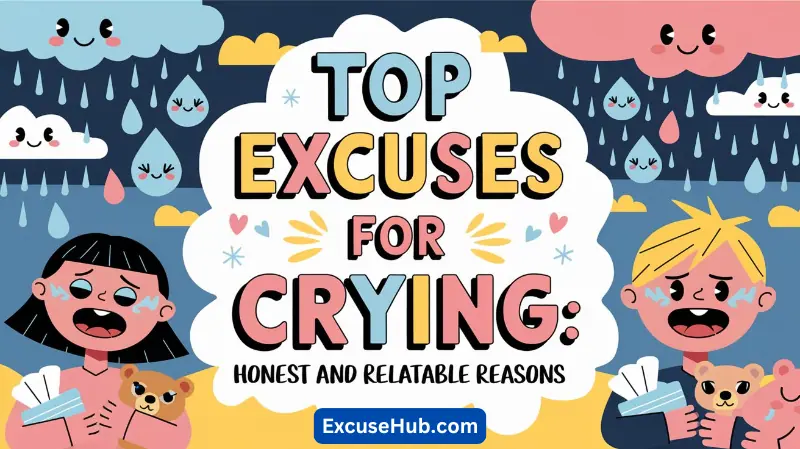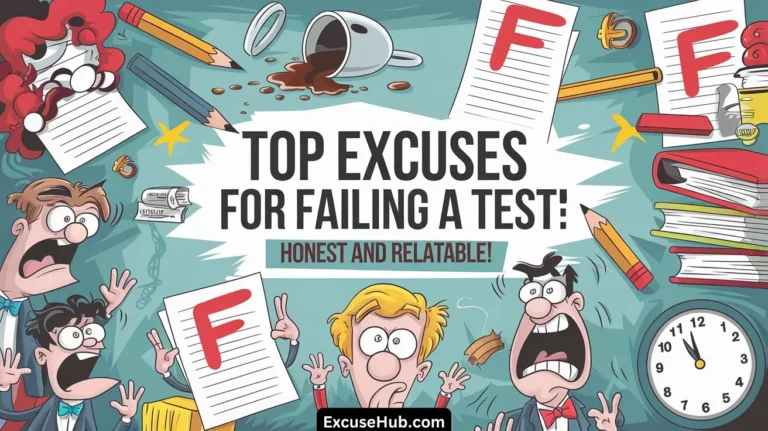Top Excuses for Crying: Honest and Relatable Reasons
Crying can stem from various sources, and it’s completely understandable to seek excuses for crying during those moments. You might find that watching a touching movie or listening to a song triggers nostalgia, making tears flow naturally.
Stress at work can also lead to overwhelming emotions, catching you off guard. Personal losses, like the sudden passing of a pet, evoke deep sorrow that can bring tears. Remember, these reactions showcase your humanity.
Acknowledging your feelings often nurtures compassion, both for yourself and others. If you reflect further, you’ll uncover deeper understandings into the emotions driving those tears.
???? Funny Excuses for Crying That’ll Make You LOL ????✨

Sometimes we all need a good cry… and sometimes we just need a good excuse for why our eyes are leaking like a broken tap! Whether you’re in public, at work, or just randomly tearing up during a cooking video, these excuses for crying will save you from awkward stares and might even get a few laughs. ???? From blaming onions to emotional support raccoons, here are the top excuses for crying that’ll make you laugh harder than your tears can flow! ????????
1. ???? “I was cutting onions!”
Excuses: Who knew onions could be so emotionally destructive?
Example: “I swear I wasn’t crying during that Pixar movie… I was just cutting onions… in my bedroom… at midnight… with no onions.” ????
2. ???? “I saw a dog video… again.”
Excuses: Because even the 87th time that puppy opens his tiny eyes is emotional.
Example: “No, I’m fine… it’s just that the Golden Retriever hugged the soldier back. ????????”
3. ????️ “It’s just allergies.”
Excuses: Classic move. Works every season.
Example: “Nah I’m not crying… it’s allergy season. Pollen gets me emotional every time my ex texts me.” ????????
4. ???? “TV betrayed me.”
Excuses: Fictional characters dying should be covered under trauma leave.
Example: “No big deal… my favorite character just got hit by a bus for no reason and I’m FINE.” ????????
5. ???? “I remembered something from 2009.”
Excuses: Flashbacks hit different after 2 AM.
Example: “I just remembered how I said ‘you too’ when the waiter said enjoy your meal. It’s been 16 years.” ????????
6. ???? “The food was too beautiful.”
Excuses: Gordon Ramsay would understand.
Example: “Why am I crying? Because my lasagna came out looking like a cheesy sunset masterpiece. ????????”
7. ???? “My phone autocorrected ‘love you’ to ‘leave you’.”
Excuses: Technology is heartless.
Example: “Now my boyfriend thinks I’m breaking up with him over tacos. ????????????”
8. ???? “I made eye contact with myself.”
Excuses: Sometimes your reflection hits you with too much truth.
Example: “I looked in the mirror and asked, ‘why are you like this?’ Then we both cried.” ????????
9. ???? “My internet lagged during the climax scene.”
Excuses: Buffering = emotional destruction.
Example: “The screen froze right before the big proposal. I waited 15 minutes… and cried the whole time.” ????????????
10. ???? “I saw a baby panda sneeze.”
Excuses: Wholesome attacks are real.
Example: “A baby panda sneezed, got scared, then hugged its mom. I’m not okay. ????????❤️”
???? Fake Excuses for Crying That Actually Work ????

Sometimes you’re crying over your ex’s Instagram story from 42 weeks ago, but telling the truth is just not an option. That’s when you need a clever little lie to save face. Whether you’re tearing up in public or your friend just caught you mid-sob, these fake excuses for crying are weirdly believable—and lowkey genius! ????????
1. ???? “I drank really cold juice too fast.”
Excuses: Apparently brain freeze now affects your eyes. Who knew?
Example: “No, I’m not crying… my juice betrayed me. It was too icy and now my tear ducts are confused.” ????????
2. ???? “I was just meditating… deeply.”
Excuses: Inner peace looks a lot like emotional breakdowns.
Example: “This isn’t sadness, it’s spiritual release. I reached level 7 Zen and it leaked out of my eyeballs.” ????♀️????✨
3. ???? “My screen time limit just kicked in.”
Excuses: When Apple ruins your TikTok therapy session.
Example: “I wasn’t crying, my phone just locked me out of my healing playlist. ????????????”
4. ???? “I sniffed that weird soap in the bathroom.”
Excuses: Mystery hotel soaps are tear gas in disguise.
Example: “No worries, it’s not emotional—it’s just that lemon lavender scent attacked my whole face.” ????????
5. ???? “I stepped on a Lego this morning.”
Excuses: Residual pain counts. Emotional damage included.
Example: “I’m not crying, I just remembered the trauma of walking barefoot through my cousin’s toy war zone.” ????????????
6. ???? “I thought about autumn.”
Excuses: Fall hits different for the overly dramatic soul.
Example: “It’s not that deep. I just imagined the sound of crunchy leaves and sweater weather… and then spiraled.” ????????
7. ???? “I overwatered my succulent.”
Excuses: Plant parenting is serious business.
Example: “My plant baby didn’t deserve that flood. I tried to hydrate it… and drowned it in affection. ????????????”
8. ???? “My mascara has trust issues.”
Excuses: It betrayed you faster than your ex did.
Example: “These tears aren’t real—my waterproof mascara just saw my crush and folded under pressure.” ????????
9. ???? “I was journaling… emotionally.”
Excuses: That pen was the real therapist.
Example: “One minute I was writing ‘Dear diary,’ and the next I was bawling over a doodle of a lonely pizza slice.” ????????
10. ???? “I finally found the last puzzle piece.”
Excuses: Completion is overwhelmingly beautiful.
Example: “It’s just… after 14 months of searching, the cat was hiding the piece the whole time. ????????????”
???? Excuses for Red Eyes Crying No One Questions ????????

So you’ve been crying—mascara smudged, eyes puffy, and looking like you’ve wrestled with a cactus. But telling someone you broke down because your playlist hit too hard? Not ideal. ???? Whether you’re at work, out with friends, or just trying not to look like a human tomato, these excuses for red eyes crying are smooth, believable, and totally un-judgeable. ????
Time to hide those tear tracks with confidence! ????
1. ???? “Allergies are brutal this time of year.”
Excuses: Nature’s the perfect cover story—no one questions seasonal misery.
Example: “It’s just the pollen. I walked past a tree and BAM—red eyes. Definitely not my feelings acting up.” ????????
2. ???? “I got soap in my eyes.”
Excuses: Because apparently your face wash wants you to suffer emotionally and physically.
Example: “Yeah I was just washing my face and the foam betrayed me. Feels like minty acid in my soul.” ????????
3. ???? “Didn’t sleep at all last night.”
Excuses: Lack of sleep = automatic red-eye pass.
Example: “I’m not upset, I’m just operating on 2 hours of sleep, a stale cookie, and pure anxiety.” ????????
4. ????️ “I rubbed my eyes too hard.”
Excuses: A quick eye itch turns into a full-blown tomato face.
Example: “I wasn’t crying, I just rubbed my eyes like I was trying to erase last night’s memories.” ????????
5. ????️ “My eyes are super sensitive to wind.”
Excuses: Because a gentle breeze is apparently your emotional trigger.
Example: “The wind attacked me. I stepped outside for 2 seconds and it turned me into a walking weepfest.” ????????
6. ???? “I stared at my screen for too long.”
Excuses: Screen fatigue is the modern-day savior for red eyes.
Example: “No breakdown here, just 8 hours of doom-scrolling through reels I didn’t even like.” ????????
7. ???? “Chlorine got me at the pool.”
Excuses: Perfect if you’re near water or just good at lying convincingly.
Example: “I wasn’t crying, I was swimming… in my bathtub. With chlorine. For emotional therapy.” ????????
8. ???? “I had a little too much to drink.”
Excuses: Alcohol + emotions = believable mix.
Example: “No tears, just tequila. My eyes do this thing where they process pain through Merlot.” ????????
9. ???? “Forgot to wear my glasses.”
Excuses: Straining your eyes = redness on demand.
Example: “I couldn’t read that text properly, and now my eyes are red—not because of what it said, obviously.” ????????????️
10. ???? “I got something in my eye while drinking juice.”
Excuses: Sounds ridiculous—but oddly works.
Example: “I opened a juice box and the universe decided I needed to cry vitamin C.” ????????
???? Excuses for Crying at School You’ll Want to Steal ????????

We’ve all had those school days. The math test was brutal, your lunch got stolen (again), or someone made a “joke” that wasn’t funny. But instead of admitting you cried because the printer jammed one more time, you need a solid excuse. ????
These excuses for crying at school are clever, believable, and just the right amount of dramatic. Steal them. Use them. Rule the hallways with dry eyes and dignity (even if you were sobbing in the bathroom five minutes ago). ????♀️????
1. ???? “I spilled juice in my eye.”
Excuses: Lunchroom tragedies happen every day.
Example: “No, I’m not crying—I just opened my juice too fast and now it’s war between my eyeball and orange pulp.” ????????
2. ???? “I laughed too hard and it got weird.”
Excuses: The accidental cry-laugh combo is real.
Example: “I was just laughing at a meme and then my body betrayed me. My eyes took the joke way too seriously.” ????????
3. ???? “I got an eyelash in my eye during the test.”
Excuses: Because your body clearly hates standardized exams.
Example: “Mid-multiple choice, an eyelash made a surprise attack and now I’m tearing up like I just failed algebra.” ????????️
4. ???? “I was running in PE… or trying to.”
Excuses: Exercise-induced tears are a thing (probably).
Example: “Definitely not emotional. I just ran 100 meters and my lungs are suing me. My eyes are testifying.” ????????
5. ???? “The book I was reading hit too deep.”
Excuses: Literature can be savage.
Example: “The character didn’t deserve that ending! I’m just emotionally invested in language arts, okay?” ????????
6. ???? “The bathroom soap is weird.”
Excuses: Mystery school soap + eyes = instant red flags.
Example: “That soap smells like chemicals and broken dreams. Now I can’t see out of one eye.” ????????️
7. ???? “I hit my elbow and the pain traveled to my soul.”
Excuses: We all know about the infamous funny bone that isn’t funny.
Example: “It was just a locker bump… but it triggered something ancient inside me.” ????????
8. ???? “Someone stole my sandwich.”
Excuses: Food-related emotions are valid.
Example: “They took my lunch. My last piece of hope. I’m not crying—I’m grieving.” ????????
9. ???? “I’m practicing for the school play.”
Excuses: Drama class cover = 10/10 genius.
Example: “Don’t worry, this is all method acting. I’m playing ‘Emotionally Unstable Tree #2.’” ????????
10. ???? “I put ice on my face and forgot my limits.”
Excuses: Ice pack therapy gone wrong.
Example: “I was trying to reduce a pimple. Now it looks like I’ve been sobbing since sunrise.” ????????
???????? Good Excuses for Crying You Can Use Anytime ????✅
Tears don’t ask for permission. One moment you’re sipping coffee, the next you’re sobbing over a commercial where a cat finds its forever home. ???? But do you always want to admit the real reason behind those tears? Nope.
That’s where these good excuses for crying come in. These aren’t wild or unbelievable—they’re smooth, flexible, and perfect for anytime, anywhere. Whether you’re crying in class, at work, or in the snack aisle of a grocery store, these will have people nodding instead of judging. ????????
1. ????️ “It’s just been one of those days.”
Excuses: Vague. Relatable. Unquestionable.
Example: “You know how some days just happen to you? That’s today. And my eyes are on strike.” ????????????
2. ???? “Too much screen time messed with my eyes.”
Excuses: Because staring into the void (aka your laptop) will do that.
Example: “No breakdown here, just 8 straight hours of spreadsheets. My tear ducts are filing complaints.” ????????????
3. ???? “I was overthinking again.”
Excuses: Everyone’s been there—and no one argues with it.
Example: “Yeah, my brain ran a marathon over something that happened in 2014 and here we are.” ????????♀️
4. ???? “I just got out of the shower.”
Excuses: Because steamy water and red eyes go hand-in-hand.
Example: “No, I’m not crying. The steam just reminded me of a sad song and the shampoo got in on the drama.” ????????
5. ????️ “The air is really dry today.”
Excuses: Blame it on the atmosphere, not your emotions.
Example: “It’s this dry air! My eyeballs are cracking under the pressure like overbaked cookies.” ????????
6. ???? “I choked on my drink.”
Excuses: Accidental drama from juice to the windpipe.
Example: “My smoothie betrayed me. It took a wrong turn and now my eyes are crying for justice.” ????????
7. ????️ “I smelled something nostalgic.”
Excuses: Scent-triggered sadness is real.
Example: “That candle smells like grandma’s kitchen. Suddenly I’m eight years old and missing her banana bread.” ????????
8. ???? “I stepped in something wet with socks on.”
Excuses: A universal trigger for emotional collapse.
Example: “The floor got me again. Sock betrayal is the worst kind of betrayal.” ????????????
9. ???? “I got a surprise message.”
Excuses: Could be good or bad—no one wants to pry.
Example: “I opened a message I wasn’t ready for. Don’t ask. Just know that emotions were typed.” ????????
10. ???? “I’m just letting it out before it builds up.”
Excuses: Emotionally mature and impressively honest.
Example: “Sometimes you cry, not because something happened, but so nothing has to. This is emotional maintenance.” ????♂️????
???????? When Movies Make You Cry: Excuses That Actually Work ????????
Let’s be real—some movies hit you right in the heart and leave you weeping like you’ve just gone through a breakup with someone you never dated. But if you’re watching with friends, family, or a date, admitting you cried when the animated dog got lost (again) can be… awkward.
That’s where these smooth excuses for crying during movies come in. Whether you’re tearing up during a romantic scene, a heroic sacrifice, or a talking snowman’s meltdown, these excuses will help you keep your cool while your soul quietly shatters. ????????
1. ???? “That light is too bright.”
Excuses: Blame the environment, not the emotions.
Example: “The theater light hit me weird. Totally not because the grandma just gave her last cookie to the orphan.” ????????
2. ???? “I got hot sauce in my eye.”
Excuses: Snacks and tragedy are hard to juggle.
Example: “Yeah, I was dipping my nachos, and then BAM—spicy regret in the eye. Not the father-daughter reunion, nope.” ????️????
3. ???? “My contact lens dried out.”
Excuses: Medical-ish and weirdly believable.
Example: “It’s just my left contact. Every time there’s emotional music, it shrivels up in protest.” ????️????
4. ???? “I have a thing with animals.”
Excuses: Universal. No one questions this.
Example: “Anytime a dog dies, or even looks sad, I turn into a puddle. It’s not the movie—it’s biology.” ????????
5. ???? “That soundtrack is intense.”
Excuses: Because some music really knows how to twist the knife.
Example: “I was fine until the piano kicked in. Then the violin showed up and my emotions left the chat.” ????????
6. ???? “I was yawning.”
Excuses: A dramatic yawn with side effects.
Example: “I just yawned like 3 times in a row and somehow my tear ducts went full drama queen.” ????????
7. ???? “I got popcorn butter in my eye.”
Excuses: Theatrical snacks are dangerous.
Example: “Mid-scene, I reached for a kernel and BAM—butter ambush. These tears are not about the grandma’s letter, I swear.” ????????
8. ????????️ “It reminded me of something… personal.”
Excuses: Vague = unchallengeable.
Example: “No big deal. It just reminded me of a moment I forgot I remembered until now. I’m fine.” ????????
9. ???? “Brain freeze hit me hard.”
Excuses: Frozen drinks, frozen feelings.
Example: “That soda slushie betrayed me. It went from chill to emotional assassination real quick.” ????????
10. ????️ “I was admiring the cinematography.”
Excuses: Be dramatic… but intellectual.
Example: “Those colors, that lighting… the symbolism of love lost in the rain… okay fine, I’m crying over fictional people again.” ????????
???????? Unexpected Emotional Triggers: When Tears Come Out of Nowhere ????????
Ever had one of those moments where you’re fine—totally fine—and then suddenly, boom, tears? ???? No warning. No sad music. No dramatic lighting. Just your emotions sneak-attacking you like a ninja in fuzzy socks.
Welcome to the world of unexpected emotional triggers, where a random scent, a forgotten photo, or a cereal commercial can crack your soul open like a soft-boiled egg. These tears don’t follow logic—they follow memory, meaning, and pure chaos. ????❤️????
Here are 10 surprisingly real things that can set off the waterworks… without warning.
1. ???? A random smell from childhood
Trigger: Scents linked to your past can drag you straight into a memory you didn’t ask for.
Example: “One whiff of that cheap vanilla lotion and suddenly I’m 8, hugging my mom before school with a Spiderman lunchbox.” ????????
2. ???? That one old song you forgot you loved
Trigger: Music unlocks emotional vaults faster than therapy.
Example: “I heard 5 seconds of that track from 2012 and now I’m reliving my teenage heartbreak next to the toaster.” ????????
3. ????️ Finding a picture you didn’t expect
Trigger: Nostalgia shows no mercy.
Example: “I opened a drawer, found a blurry photo of me and my grandpa, and now I’m crying over polaroid pixels.” ????????
4. ???? A snack you haven’t had in years
Trigger: Taste buds with memories.
Example: “I bit into a Fruit Roll-Up and instantly remembered a field trip where I got lost but made a friend. My heart exploded.” ????????
5. ✉️ An old message you forgot was saved
Trigger: Words hit harder when they’re from a different version of you.
Example: “Scrolled up too far in my texts and found a message that said ‘I’m proud of you.’ From someone who doesn’t text anymore.” ????????
6. ???? An empty chair or quiet corner
Trigger: Silence can scream.
Example: “I walked past my grandpa’s old chair. No one said anything, but my heart did.” ????????
7. ???? A scene in a movie that hits too close
Trigger: Fiction + your real life = emotional ambush.
Example: “That random side character’s breakdown mirrored mine last year. And now I’m crying into popcorn like it’s a tissue.” ????????
8. ???? Making your bed and feeling… lonely?
Trigger: Routine activities can reflect your emotional state back to you.
Example: “I was just fluffing a pillow and suddenly remembered what it felt like when someone used to help. Cue the silent sobbing.” ????️????
9. ???? Seeing your old stuffed animal or childhood toy
Trigger: Innocence remembered is bittersweet.
Example: “I found Mr. SnuggleBear in the closet and hugged him out of instinct. Next thing I know, I’m weeping over my lost childhood.” ????????
10. ???? A date you didn’t expect to remember
Trigger: Time keeps receipts.
Example: “I looked at the calendar and realized it’s the anniversary of something I never processed. My heart remembered even when my mind forgot.” ????????
Tears don’t always need permission. Sometimes, your soul just needs a release—and life hands it a trigger when you least expect it. ????️????
???????? Pet Loss Tears: Unexpected Triggers and How to Explain Them ????????????
Losing a pet isn’t just sad—it’s earth-shifting. They weren’t just animals. They were your nap buddy, your emotional therapist, your personal greeter at the door. And while life moves on, grief often doesn’t. What’s worse? The tears that sneak up on you… weeks, months, even years later.
That’s the hard part about pet loss tears—they don’t always arrive with warning. One small thing can unleash a flood. And when someone sees you tearing up in the middle of a grocery store or scrolling Instagram? You need a way to explain it—without having to relive the whole thing.
Let’s talk about the unexpected triggers and how to gently explain them when words are hard. ????????
1. ???? Trigger: A random chew toy at the store
Why it hits: That toy used to be their favorite—and suddenly it’s sitting on a shelf like nothing happened.
How to explain:
“I just saw a toy that looked exactly like the one my dog used to carry around… it brought back more than I expected.” ????????
2. ???? Trigger: Hearing the jingle of keys or collar bells
Why it hits: That sound meant tail wags, face kisses, and running paws.
How to explain:
“Certain sounds still make me expect them to come running. I forget sometimes… and then I remember.” ????????
3. ???? Trigger: A photo memory notification
Why it hits: Your phone just time-traveled you into a moment when they were still here.
How to explain:
“My phone showed me a picture of my cat curled up on my lap from last year. I wasn’t ready for that today.” ????????
4. ????️ Trigger: A spot they used to sleep
Why it hits: The space is physically empty, but emotionally full.
How to explain:
“Sometimes I still check the corner of my bed out of habit… and remembering that it’s empty stings more than I expect.” ????????
5. ???? Trigger: Making food and almost reaching for their bowl
Why it hits: Muscle memory doesn’t always get the memo that they’re gone.
How to explain:
“I was prepping food and almost filled their dish like I always did. It just… caught me off guard.” ????️????
6. ???? Trigger: Finding their leash, collar, or tag
Why it hits: You kept it for memory—but sometimes memories open wounds.
How to explain:
“I came across their leash today. It still smells like them. It was too much in that moment.” ????????
7. ???? Trigger: Seeing a pet in a movie or commercial
Why it hits: Fictional animals still feel so real when your own grief is raw.
How to explain:
“There was this dog in the movie that looked just like mine. I thought I was fine… but I wasn’t.” ????????
8. ???? Trigger: Rainbow references or “crossing the bridge” quotes
Why it hits: Those phrases are kind, but they cut deep when you’re still healing.
How to explain:
“I saw a quote about the Rainbow Bridge and it reminded me of the last day we had together. The tears just came.” ????????
9. ???? Trigger: An old blanket or shirt with fur still on it
Why it hits: Their fur is still part of your world… even when they aren’t.
How to explain:
“I pulled out an old hoodie and found some of their fur on the sleeve. It made me pause… and cry.” ????????
10. ???? Trigger: Someone asks, “Do you have pets?”
Why it hits: The question feels simple—your answer is not.
How to explain:
“I used to… and I still think about them every day. It just caught me off guard.” ????????????
???? Final Thought
Grief doesn’t have a schedule, and it doesn’t need permission. If the tears come, let them. You’re not broken—you’re just remembering someone who loved you unconditionally.
And if you ever need an excuse?
You don’t.
You’re allowed to feel. Always. ????❤️
???? Apology Note for Tears ????????
Subject: I’m Sorry for My Tears Today
Dear [Name],
I just wanted to take a quiet moment to say I’m sorry for getting emotional earlier. Sometimes, no matter how hard we try to stay composed, the feelings inside find their way out—and today, mine did. ????
Please don’t take my tears as a sign of weakness or drama. They were just a reflection of everything building up beneath the surface—stress, overwhelm, or maybe even just the weight of things I haven’t fully processed.
I’m not looking for pity or attention. Just understanding. And if my emotions made you uncomfortable or caught you off guard, I truly apologize.
Thank you for your patience, your kindness, or even just for not judging me in that moment. It meant more than I can say.
With warmth,
[Your Name]
Conclusion
In the grand theater of life, tears are your uninvited guests, crashing the party when you least expect it. Whether it’s a heart-wrenching movie scene or the sudden loss of a furry friend, crying doesn’t follow a script.
You might find yourself sobbing over spilled coffee at work, and that’s okay! Welcome those moments; they remind you of your humanity and serve as valid excuses for crying. After all, a good cry can be as cathartic as a thousand motivational speeches, so let those tears flow unapologetically.
What are some common excuses for crying in public?
Common excuses include feeling overwhelmed with stress, experiencing a personal loss, or being moved by a touching story or movie scene.
How can I explain my tears without revealing too much?
You can say you’re feeling emotional due to a stressful day or that something unexpectedly reminded you of a past experience, keeping it vague.
Is it okay to cry at work or in social settings?
Yes, it’s perfectly natural to cry in these environments. Just be honest about your feelings, and if needed, take a moment to regain composure.
What should I do if I cry during a serious conversation?
Acknowledge your emotions, take a deep breath, and if necessary, briefly step away to collect yourself before continuing the discussion.
What are some light-hearted excuses for crying?
You can say you’re crying because you laughed too hard, you’re feeling sentimental about a cute pet video, or you were just watching a tear-jerking commercial.







